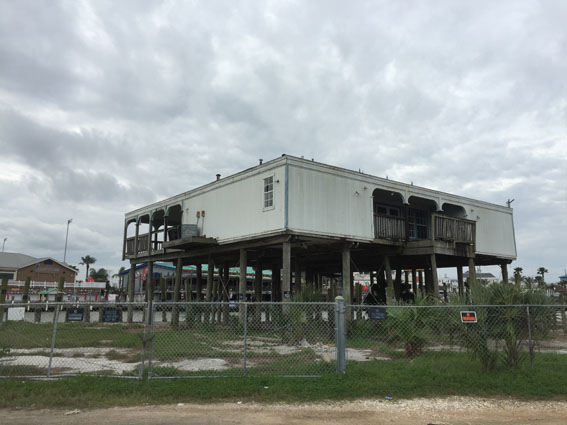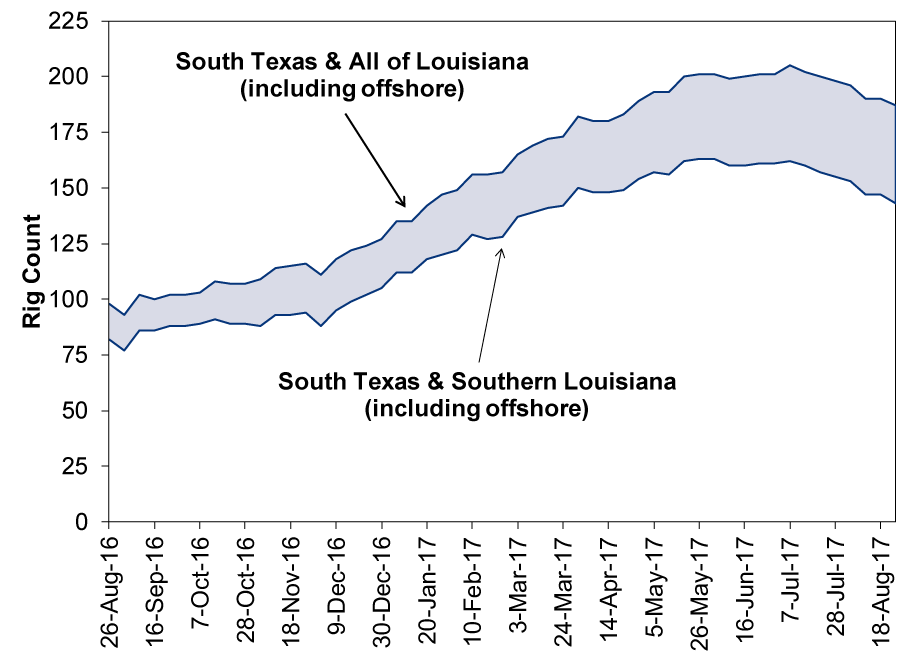Personal Wealth Management / Market Analysis
We Need to Talk About Harvey
Like all major hurricanes, Harvey won't bring recession or economic stimulus.
An abandoned business, destroyed by Ike in 2008, lies fallow along The Point in Seabrook, TX as the Kemah Boardwalk thrives in the background. Photo by Elisabeth Dellinger.
It was the best of times, it was the worst of times. The worst, you've seen across the Internet: horrific damage along the coast near Corpus Christi; catastrophic flooding across the entire Houston metro area; 30,000 and counting homeless; economic damage potentially on par with Hurricane Katrina's estimated $160 billion. And yet, we also saw the best of humanity as citizens risked their own lives to help their fellow man. Normal people with kayaks, rafts, boats and tall trucks going where First Responders couldn't, plucking neighbors and strangers from flooding homes, cars and rooftops-singlehandedly disproving the media's myth of a divided, hate-filled America. As with any major natural disaster in recent American history, this isn't a time for investors to fear recession or bear market. It's simply a moment to hope and pray for our friends and neighbors.
This one's personal for me. I spent summers in Houston growing up, and most of my mom's family still lives down there, in a little seaside town between Houston and Galveston. We used to go to Aransas, Harvey's ground zero, to see the whooping cranes. My grandparents rode out Alicia and Alison, flooded in Ike, and spent much of the weekend sopping up water as it seeped into the spare bedroom. They're blessed-the houses across the street, right on the bayou, have several inches of water on the ground floor.[i] So if anyone knows the destruction storms like this can bring, it's us. And if anyone knows how life and commerce go on after major storms, it's us.
We are also well versed in separating local from global and national. Harvey will take a toll on Houston, just as Ike did-and just as Katrina did to New Orleans, Sandy did to New York and New Jersey, Andrew did to Florida, and so many more. And yes, Houston is one of America's biggest metropolises. But most of the damage (we will get to the oil & gas industry in a moment) is not the sort of thing that will register to stocks. When Tookie's Burgers on Highway 146 closed for three years after taking five feet of water in Ike, it was a loss for the workers and owners, but it was also irrelevant to every publicly traded firm in America. If the Kemah Boardwalk takes damage again, it will be hard on local restaurant magnate Tilman Fertitta, but his company (Landry's Inc.) is privately held. If you go up and down the list of impacted businesses in any storm, the bulk of them will be private or mom-and-pop. Some rebuild and bounce back; some stay boarded up for years. Their closures and costs are a huge deal to those directly impacted, but it is also just too small to register much on a national scale.
For now, it's too early to begin tallying the damage. Some estimates are out there, but with Harvey presently rebuilding strength in the Gulf and preparing to barrel back over Galveston and Houston on Wednesday, there is no way to know the eventual total cost. But it is worth noting that none of those major storms I noted earlier caused a recession. Ike struck during the financial crisis, a week before Lehman imploded, but that is a coincidence. Harvey's economic wreckage should be similarly small. Even if it hits $200 billion, more than Katrina, it is just 1.0% of total US GDP-bad, but still small enough for growth elsewhere to offset. (Besides, GDP is an annual flow of economic activity. The damage estimates are to assets, and America's national assets far exceed GDP.)
Whenever disaster strikes, some try to find a silver lining by arguing the rebuilding efforts contribute to economic growth, providing a shot of stimulus. We are not fans of this reasoning, and not just because it's insensitive. For one, while rebuilding does attract spending and investment, this isn't a net positive. Forgive the tautology, but destroyed property is destroyed property. Money spent on rebuilding isn't magic or good. It is money redirected from other, often better avenues. As French philosopher Frederic Bastiat put it centuries ago: If the baker's son breaks a window, sure, it's good for the glazier who gets to repair it, but it's bad for the baker who now has to buy a new window instead of something fun, like new shoes. Which makes it bad for the shoemaker and whichever businesses the shoemaker would have patronized. Try telling the five-sixths of Houston homeowners who lack flood insurance that their rebuilding investments are good for the economy. Try telling the shopkeepers who will return to their storefronts in the coming days to find nothing but water damage and ruined inventory. Yes, the investment will eventually show up as positive in GDP, but that speaks more to GDP's shortcomings as an economic measure than anything else.
All that said, those of us not in Texas and Louisiana will probably feel a Harvey-related pinch in the coming days and weeks. Not only is this prime oil drilling territory, both in shale fields and offshore, but the region is home to nearly one-third of America's gasoline refining capacity. Several refineries along the Texas coast and Houston ship channel went offline and took damage during the storm. Supply is already getting tight, and depending on the extent of the damage, it could stay that way for a while. Oil production might also dip, as 15-20% of the country's rigs could be in the impacted areas, depending on how much of Louisiana gets hit. (Exhibit 1) So far, however, crude prices are down, not up. So gas is the swing factor. Years of far higher gas prices didn't hold back this expansion. Nor did the falling gas prices we've enjoyed since 2014 massively boost consumer spending. Volatile gas prices influence how much cash we all can spend on other, more fun things, but that's about it. They aren't a significant economic driver. To the extent Energy firms take a hit, it is just one more problem for the long-beleaguered sector, whose problems markets are well aware of. Insurers also took a hit on Monday, as investors grappled with the prospect of eventual payouts, but this is fairly normal, and Harvey doesn't appear to put any insurers (or re-insurers) at risk of failure.
Exhibit 1: Oil Rig Count in Harvey's Path
Source: FactSet, as of 8/27/2017.
For me, the biggest takeaway is the one I started with: Our communities are much closer-knit than apoplectic coverage of recent protests would have you believe. Those spewing hate and violence are a tiny fraction of society. Sometimes it just takes a major disaster to see what's real and isn't real. Harvey didn't discriminate. It flooded rich and poor neighborhoods alike. River Oaks (the setting for Terms of Endearment) looks to have as much standing water as Telephone Road, one of city's poorest corridors. Yet in both areas and everywhere in between, there are so many stories of good Samaritans. Sociological "barriers," whether political or otherwise, go out the window when lives are on the line. Gutsy volunteers shepherding people out of harm's way? That's the real America.
[i] This is a Houston thing. If your house is by the water, either you build on stilts, or your ground floor is not officially part of the house-just garage or storage. Functionally it's like having your house on stilts, only the bottom level is closed in and looks like a house.
If you would like to contact the editors responsible for this article, please message MarketMinder directly.
*The content contained in this article represents only the opinions and viewpoints of the Fisher Investments editorial staff.
Get a weekly roundup of our market insights
Sign up for our weekly e-mail newsletter.

You Imagine Your Future. We Help You Get There.
Are you ready to start your journey to a better financial future?

Where Might the Market Go Next?
Confidently tackle the market’s ups and downs with independent research and analysis that tells you where we think stocks are headed—and why.







